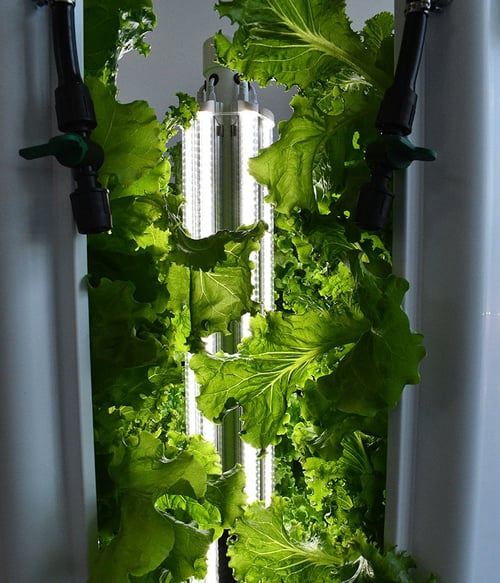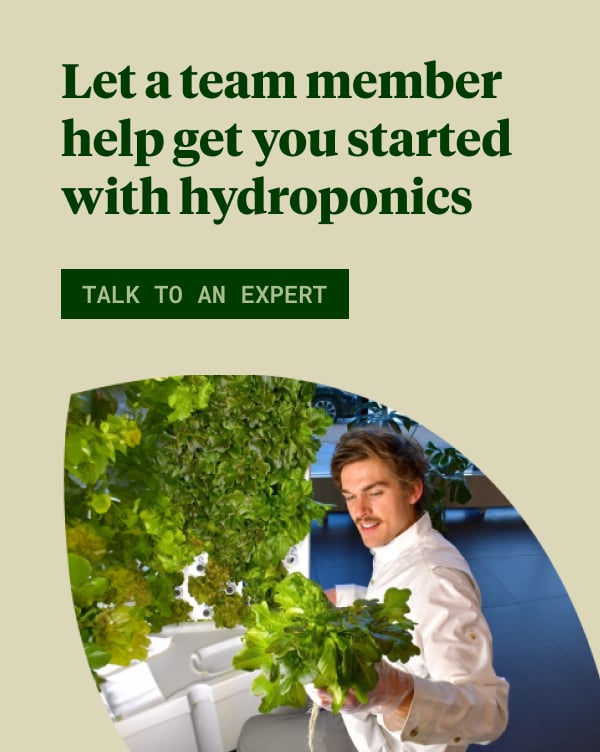Indoor Garden Systems: What Are They And Should You Buy One?
Indoor garden systems are revolutionizing how people grow plants and vegetables. Rather than using traditional soil and depending on the elements (sunlight, humidity, etc.) to promote growth, indoor systems use a climate-controlled environment to create the ideal conditions for an optimal harvest.
Arguably the most effective indoor system, hydroponics involves growing plants in a water-based solution packed full of nutrients. While delivering these essential nutrients directly to the plant’s roots, hydroponic systems also control factors like light, temperature, and pH levels, thereby protecting crops from unpredictable weather and outside intruders like pests or soil-borne pathogens.
Whether you're an experienced gardener looking to grow more plants inside or a beginner interested in sustainable gardening, indoor hydroponic systems provide a convenient and effective way to cultivate fresh produce.
That said, you may have a few questions about these systems before determining if one is right for you. So, let’s get our hands dirty (not literally, of course!) and find some information on indoor gardening and whether you should buy a system of your own.
Indoor Gardens: An Overview
It should be noted that while there are some different types of indoor garden systems, our focus here is on hydroponics, which in our opinion is the most efficient, effective, cleanest, and easiest-to-manage method around. Why is that? Glad you asked!
Unlike traditional agriculture, where plants get nutrients from the soil, hydroponically grown plants have their roots submerged in a nutrient-rich solution that contains all the necessary minerals for healthy growth. Instead of soil, hydroponic systems use materials like rockwool, coconut fibers, or clay pellets to support the plants, which can produce a wide variety of fruits, vegetables, and herbs.
The vast majority of hydroponic systems are set up indoors, giving you precise control over the growing environment. These systems can be placed in a variety of spaces, including balconies, closets, unused rooms, vacant buildings, classrooms, etc. They can be adjusted to fit different sizes, from quite small to rather large, and can even be stacked vertically to make the most of the available space.
One prime example is the Flex Farm, a highly scalable, vertical system that requires less than 10 square feet of growing space. It’s a dynamite solution for homes, schools, or almost any other application. Even with its modest footprint, the Flex Farm allows you to harvest up to 3,400 plants a year. For larger operations–typically four to 12 Flex Farms–there’s the Flex Connect, whose modular design lets growers manage their farm through a single water system.
Big-picture, hydroponics allows for efficient and controlled plant growth, eliminating any issues associated with soil quality and/or availability. It has the potential for higher yields, faster growth, and better pest and disease management, not to mention having no need for pesticides or other potentially harmful chemicals. This method is also water-efficient, reducing environmental impact and enabling year-round cultivation (stay tuned for more on that).
Should You Buy An Indoor Garden System?
Several advantages of hydroponic systems over soil-based gardens make them an attractive option for both commercial growers and home gardeners. Among them are ease of use, minimal space requirements, and the ability to produce fresh food year-round. In fact, one of the top systems even comes with robust customer support and service, as well as an active community of fellow gardeners for sharing tips, advice, and information.
All of this means that almost anyone with the desire and budget and at least 10 square feet of available space can operate a hydroponic garden. Now, the question of whether you should buy one depends largely on whether the following features and benefits of hydroponics sound appealing and/or align with your individual goals:
- The ability to produce a lot of fresh food in a small area. Hydroponic gardens are designed to take up very little room; many systems utilize a vertical gardening approach, which, as the name implies, allows you to stack plants skyward, resulting in especially dense yields per grow space.
- The ability to produce a lot of fresh food with very little maintenance or upkeep required. While tending to crops in a traditional garden can be time-consuming, hydroponic farms can be managed with as little as two hours of regular maintenance each month.
- The ability to produce a lot of fresh food any time of year. Using artificial lighting and climate control systems, indoor hydroponic growers can create a stable and consistent environment for their plants, regardless of the season. Crops can be grown even in regions with extreme weather conditions or limited sunlight hours.
- The ability to produce a lot of fresh food with high nutrient content. Because nutrients are delivered precisely and accurately through the plants’ water system, hydroponic crops receive optimal nutrition for vitamin- and mineral-rich produce.
- The ability to produce a lot of fresh food while conserving resources. On average, hydroponic systems use about 90% less water than traditional farming. Any unused water is recycled, filtered, refreshed with nutrients, and then recirculated back into the system.
- The ability to produce a lot of fresh food for a number of uses. Hydroponic farming is ideal for home use, as an educational activity, for commercial purposes, or as a community service project. Versatile and scalable systems allow growers to configure their gardens to suit a variety of applications and production goals.
While we could easily list another half-dozen or more reasons why indoor gardens are a fantastic choice, we do recommend researching the options to make sure you’re comfortable owning and operating these units. That includes factoring in costs–the system itself, along with ongoing electricity, water, and replacement supplies–as well as the time and energy commitment of managing an ongoing operation.
That said, it’s our opinion that the benefits of hydroponic systems make them a worthwhile investment for anyone looking to improve their gardening chops while producing fresh fruits and vegetables year-round. For more on starting your own indoor garden, reach out to a Fork Farms team member today!
Subscribe to our blogs
Is the Flex Farm right for you?
Connect with an expert member of our team and let’s work together to bring your growing experience to life. To help get you connected with the best person, please tell us where you are located.



